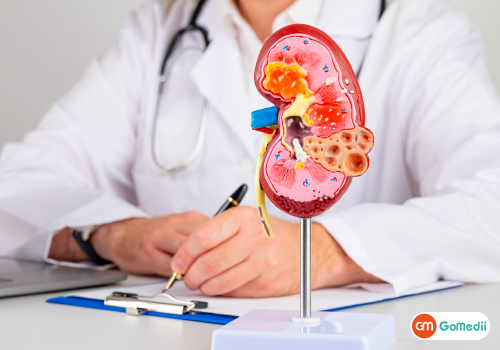How to Manage Pain After Kidney Surgery
Whether partial nephrectomy or radical nephrectomy kidney surgery is a major life event. Management of postoperative pain is very important for the recovery process and maintenance of quality and comfort in life. This guide shall look into effective strategies for pain management after kidney surgery from both medical and home remedy aspects.
Understanding Pain After Kidney Surgery
First, it is important to realize that renal surgery will be painful to some degree. The extent may vary according to the type of surgery, individual pain threshold, and general health conditions. Usually, patients may face:
Incisional Pain: Pain around the incision, usually sharp or throbbing.
Referred pain: Pain might also extend to other areas even to the back and abdomen.
Muscle Pains: Aches arise from surgical positioning or lack of activity in general following surgery.
It helps them go out to fight against their ailment mentally and emotionally during recovery.
Medical Pain Management
Medications
Medications were the most common method for managing post-surgical pain. The doctors could prescribe a combination of the following:
Opioids: Pain may require painkillers. They can help with severe forms of pain but due to the risk of after-sickness and dependency, they are used only for small lengths of time.
Nonsteroidal Anti-Inflammatory Drugs: It is readily available over the counter, under names such as ibuprofen, or by prescription. It relieves pain and reduces inflammation.
Acetaminophen: This drug, many times prescribed in cases of mild to moderate pains, may act as a very useful substitute or complement owing to NSAIDs.
Local Anesthetics: Nerve blocks or local anesthetic infusions can be very effective methods of ensuring analgesia to the site of surgery, with very few side effects experienced by the patient.
Follow Your Doctor’s Instructions
Take medications as scheduled by your doctor. If you have side effects or discomfort due to pain not relieved, inform your doctor. Receives another medication or dosage adjustment if necessary.
Non-Pharmacological Pain Management Techniques
Besides medication, there are numerous other non-medication-based methods that can be employed to alleviate pain.
Physical Therapy
The best remedy, when it can be safely done, is physical therapy. Others are benefited by a physical therapist who can teach the patient exercises that could enhance mobility and give strength to a set of muscles surrounding the area where the surgery was performed. It helps eliminate possible complications such as stiffness or blood clots and reduces pain.
Heat and Cold Therapy
Application of heat or cold packs will help alleviate the pain and discomfort.
Cold Therapy: This will involve the application of cold pads or compresses around the surgical site to reduce edema and numb sharp pains. Each application can be done for 15–20 minutes at a time, having a protective layer of cloth between the ice pack and the skin to prevent skin damage.
Heat Therapy: After the initial swelling has completely gone heat pads may relax the tensed-up muscles and allow proper resumption of blood flow for the purpose of recovery.
Relaxation Techniques
Anxiety and stress can also magnify pain. Relaxation techniques can help counteract this ingredient. Consider:
Deep Breathing Exercises: A focus on slow deep breathing can help relax the mind and eliminate stress.
Mindfulness and Meditation: These practices are aimed at training the mind to deal better with pain and also improve general emotional wellbeing.
Gentle Yoga or Stretching: Gentle movements, provided your doctor permits, may help to rid tension and relax you.
Lifestyle Adjustments for Pain Management
Making certain lifestyle changes can also contribute to a smoother recovery process.
Nutrition
A diet rich in fruits, vegetables, whole grains, and lean proteins will help with recovery. Sufficient liquid intake is vital to assist the kidneys and the healing process as a whole.
Sleep Hygiene
Rest and sleep are crucial to recover. Making sleeping more comfortable and maintaining a sleeping routine may help. Pillows could be adjusted for support of the body or sleeping positions modified if pain interferes with sleep.
Gradual Return to Activity
Although rest is important, gentle movement can help promote healing. Gradually resume activity, including exercise, based on guidance from your clinician. Also avoid heavy lifting or strenuous activities until advised it is safe to do so.
When to Seek Medical Attention
While pain management post-surgery is normally within a bearable limit by using the above techniques, sometimes you may have to seek further medical help. You should consult your health provider when you notice the following:
Severe or worsening pain that is not improved with medication. Signs of infection such as fever, chills, or increased redness and swelling around the surgical site.
Other symptoms, less common, may involve difficulty breathing, bleeding excessively, or changes in bowel or bladder habits.
Conclusion
Pain management post kidney Treatment should therefore be multivariate, and this would include medical treatment alongside lifestyle modification and self-care techniques. Understanding the nature of pain and using different strategies will create a better recovery experience with an improved quality of life.
It is always highlights that health professionals make pain management specific to an individual’s needs. Recovery, when supported with the right help and materials can be a much easier journey to bear. After all it is not just about the management of pain but a way of healing and back to normal life from surgery.


